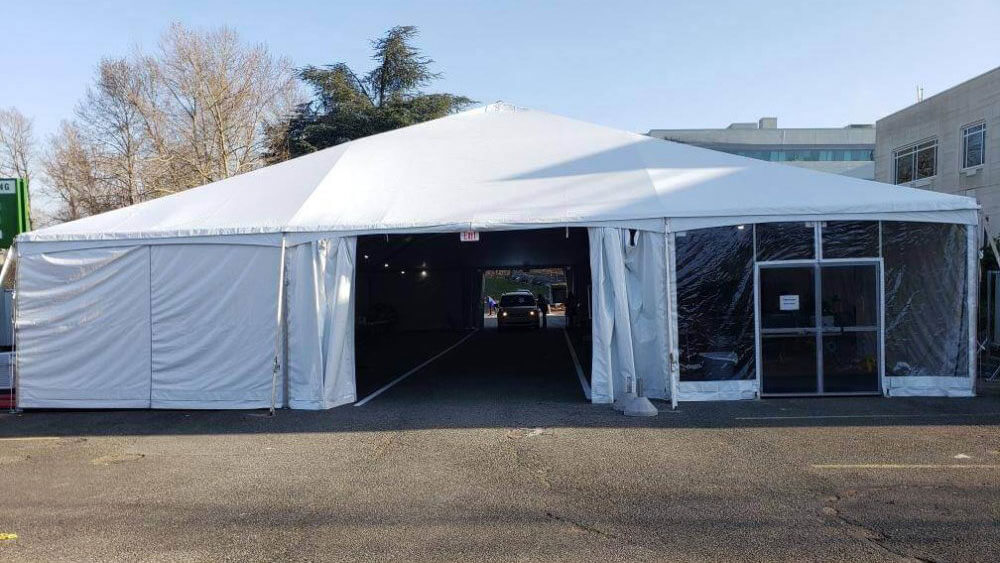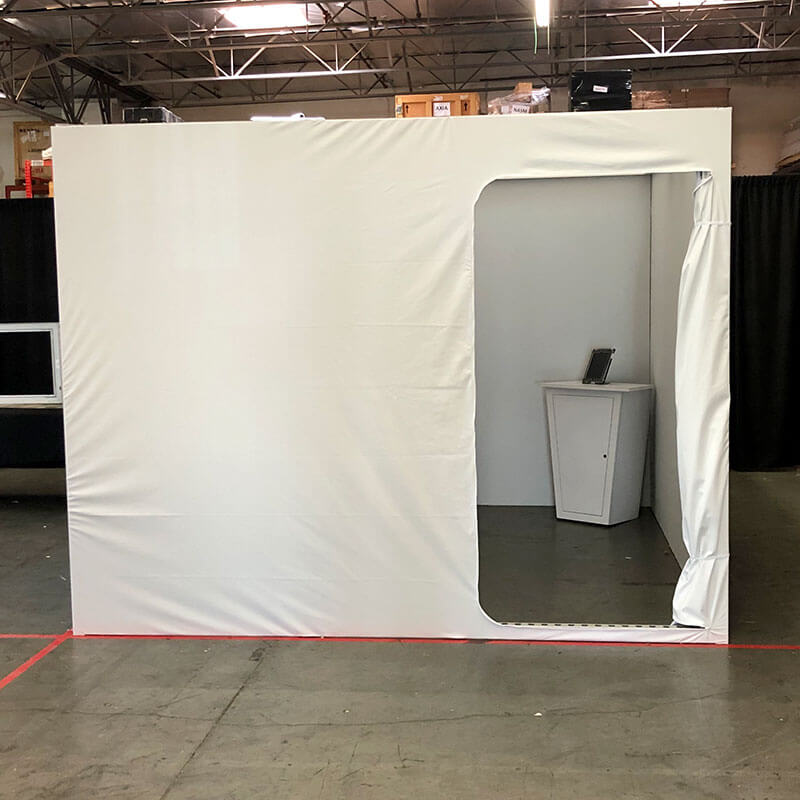
For drive-through testing sites, Alexander Party Rentals designed a tent that allows a car to drive through it.
Gap and Christian Siriano are making masks. Dyson is building ventilators. As hospitals in some major U.S. cities near the brink of capacity, the rapid transformation of space is quickly becoming the next precious commodity. Businesses across the event industry spectrum — including tent-rental companies and exhibit designers — are quickly realizing that they can step up to help.
For Alexander Party Rentals, it was like somebody had flipped a switch. “On Friday, we left the office working on conventions, special events, and weddings. On Sunday, we were setting up hospital rooms,” said Bonnie Lackey, executive account manager at Alexander Party Rentals.
Based in the Greater Seattle area, Alexander Party Rentals provides a wide inventory of rental equipment for events and weddings — everything from tents to tablecloths. But for the past three weeks, the team primarily has functioned as a disaster response team, completing about 15 installations for local first responders, government agencies, and hospitals. They’ve set up overflow space for 200 hospital beds, as well as decontamination and testing tents.
“We’ve certainly had to come up with a few custom solutions,” said Scott Alexander, president of Alexander Party Rentals. For drive-through testing sites, they designed a tent that allows a car to drive through it. They also reworked a tent framework to house temporary hospital rooms.

Theron Whitney of exhibition design firm Xibeo tweaked a design for a portable conference room to create this hospital room.
More than 1,000 miles south of Seattle, Theron Whitney is working to design a similar solution — a sanitary, portable hospital room. Whitney is the vice president and co-owner of Xibeo, an Oxnard, California–based company that designs exhibits for trade shows and exhibitions.
When the COVID-19 outbreak started to surge in early March, Whitney began tinkering with a previous design for portable conference room walls, adding a ceiling and using a rubberized material that can be easily sanitized. He says that the lightweight, aluminum frame can be assembled without tools and that the design allows for interior electrical wiring and the mounting of medical equipment. A vinyl floor equipped with double-faced tape creates a seal. “This creates a secure, isolated room to keep out any viruses from the outside,” Whitney said.
He’s also in the process of designing field ICU beds that can be shipped in pieces and assembled on site, as well as a walk-up counter with built-in plexiglass “sneezeguards” for restaurant employees to use during curbside pickup.
Whitney’s next challenge is to quickly get the word out to the right people, so that the products can be tweaked, if necessary, then manufactured, and finally delivered. “I’m reaching out like a madman to everybody. I’ve been sending out e-mails, saying, ‘Hey, I have a solution, let me know how we can help,’” he said. “And now we’re getting to crunch time where the amount of time we have to it in is much less. We have to act now.”

Choura Events is building out temporary testing sites and overflow spaces throughout Southern California with the company’s own inventory of tents.
A Rallying Cry
Ryan Choura, CEO and founder of Choura Events, feels the same sense of urgency. “I see so many event companies sitting around [complaining] — ‘we don’t have any business, work is slow, everyone has canceled,’” he said. “Let’s go, let’s help!”
Any other year, Choura would be hard at work building out the Coachella Valley Music and Arts Festival and the Stagecoach Festival with his 130-person team. Instead they’re building out temporary testing sites and overflow spaces throughout Southern California with the company’s own inventory of tents and other kinds of portable infrastructure.
“The structures we are building are fully customizable and scalable depending on the site,” explained Tatum June, creative director at Choura Events. “Rather than deliver the same asset everywhere, we’re working with the hospitals to understand their specific needs to optimize the most effective plans and layouts.”
The team can build structures up to 50,000 square feet and equip them with everything from Internet to negative air pressure, June said, adding that the structures “are less like tents and more like buildings.”
Choura said when events were canceled, management “really worked to pivot our company to figure out how to be a solution for whatever was needed, and we saw that was needed with hospitals and government agencies. Hospitals need planners from a facility, design, and layout perspective.”
He believes that the meetings and events industry is uniquely equipped to confront that logistical challenge. Now it’s just a matter of being proactive. Choura wasted no time putting the word out to his own clients and connections, and Choura’s Instagram page communicates that message loud and clear.
Alexander took the same approach after they lost half of their bookings for March, then just as quickly lost all of their bookings for April. That’s when they began reaching out to local hospitals, government agencies like the CDC and the local department of health. “We’ve been very aggressive about trying to find as much business as possible,” Alexander said. For now, these projects will help him keep the lights on. Alexander anticipates that for the next month, they should be operating at normal revenue levels, but foresees a possible lag between the time the hospitals and others need his services and when customers will start booking events again.
Alexander emphasizes that opportunities are out there for businesses in the meetings and events industry. “My advice would be to immediately reach out to any local medical facilities and see if they have a need,” he said. “Be proactive, don’t wait for the phone to ring.” He also suggests updating websites and Google ad words to convey that services and products are available for disaster response and recovery. “Most of these groups, they need these products in about 48 hours once they realize they need it. So being top of mind, and the first one they call is very important. They don’t have time to get six bids and decide on the perfect solution. It’s just, ‘Can you be here in a couple of days?’”
For Whitney, his next hurdle to jump is getting orders to fund the production of his designs. “We started to feel the pinch in February,” he said. “We’ve been without any business for a month now.” Nevertheless, he’s adamant that he and his team do something. “We’re not just going to sit here and do nothing when we have the ability to help in this crisis.”
What Events Professionals Need to Know About COVID-19
PCMA has created a COVID-19 resources page to help event professionals find reliable information about the outbreak and to share events industry-related resources to ensure they are prepared.
